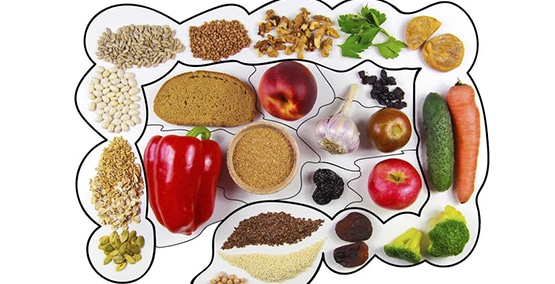
Specific diets for Crohn's disease
As I indicated in my blogpost on nutrition for inflammatory bowel disease (IBD), the role of a good diet has been on replacing or supplementing nutrients that may not be absorbed because of intestinal swelling. Additional goals include promoting growth in the children, and supporting the good health of patients with IBD.
But now the thrust is beginning to move with greater questions in mind. Can nutrients move from a supportive element to become primary therapy? It's not as outlandish as it may seem. We think that Crohn's results from a malfunctioning immune system that's responding to a trigger, possibly an infection or something coming through the gastrointestinal tract. We also know that the intestinal microbiome can be protective as if it's an arm of the immune system (see the blogpost on intestinal bacteria as well), and we know that nutrients can change the microbiome (in both good and bad ways), depending on what you eat.
Evidence-Based Therapy
Total enteral therapy (liquid formula, most often delivered by a tube that goes into the stomach through the nose) is as effective as effective as steroids in helping children with newly diagnosed Crohn's, without the side effects that frequently accompany steroid use. Total intravenous nutrition (IV therapy) is also effective; however, that has its own set of side effects. And neither is appropriate for long-term therapy. As a result, some researchers including myself are using a combination approach allowing patients to eat a small amount while maintaining 80% of their calorie needs with enteral formulas.
The specific carbohydrate diet
The specific carbohydrate diet (SCD) has become popular among patients and is now being investigated as an alternative therapy. The idea is that by eliminating fermentable carbohydrates, the microbiome will be changed to have healthier intestinal flora.
So far, the only data that has been published is from the University of Washington where they collected the information from 7 patients who were on the diet between 5 and 30 months (an average of 14 1/2 months). Three of the patients began immediately after diagnosis, 2 after 2 months of enteral therapy and 2 others after other medicines were tried. All improved within 3 months, whether they had mild, moderate or severe disease, and all 7 continued on the diet. It's a small study, certainly, but we hope to be adding our own published trial to the data soon (a blogpost, with the actual diet we used, will appear when that occurs).
The problem is that the SCD is very restrictive, making it difficult to follow away from home and difficult for the children to stay committed to. And of course, there's very limited data on whether it works or just makes patients feel better, with no data on how it works.
The paleo diet
A similar diet is the Paleo or caveman diet that is based on the idea that humans should return to the historical diet when mankind existed as "hunter-gatherers" by eating the foods they could kill or forage. There have been a number of criticisms of this diet based on inaccuracies. Compared to the SCD, the Paleo allows maple syrup, 100% cocoa, and sweet potatoes; does not allow legumes; and requires grass-fed beef. Whether these subtle differences make any real difference is unclear; but most importantly, there are no published results of this diet in IBD.
Supplements: fish oil and probiotics
There's evidence that neither fish oils nor probiotics (at least the one tested so far) have any impact on Crohn's disease–with one published study showing fish oil had no effect. However, there is some improvement in ulcerative colitis with a combination probiotic, VSL #3, at high doses (see the blogpost on intestinal bacteria in IBD).

Bottom Line:
Momentum is building to study nutritional therapy for Crohn's disease. the only therapy proven effective is exclusive enteral nutrition or total intravenous (IV) nutrition. Clinical trials may support the use of certain more liberal diets, especially the Specific Carbohydrate Diet, but we aren't there yet.
If you proceed on your own, please exercise caution, including (but not limited to the following):
- Children can lose weight initially getting used to the diets and they can have trouble following them at school or when they are away from home. The diets can seem worse than the disease emotionally for some of the children, especially if they feel they are being pushed into them.
- They may not work for everybody (because as you will note from my blogpost on the cause of Crohn's, there are lots of variations).
- If you are going to try one of the diets, do so with help and supervision from your doctor and a registered dietitian
If you would like more information, Nutrition4IBD.com may be able to help. And if you still would like more, contact us at Dr.Stan@Nutrition4Kids.com, perhaps we can answer your questions.




